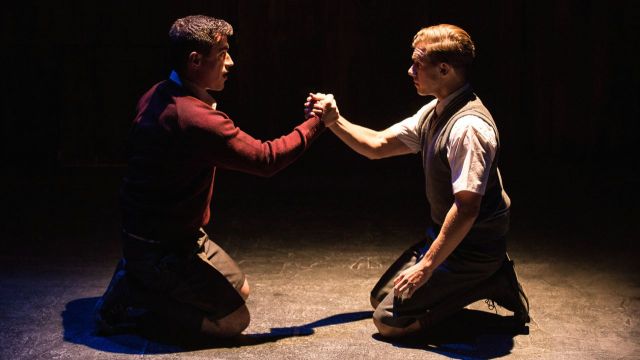Blood Brothers
Blending Greek Tragedy with musical theatre, Blood Brothers’ powerful drama lays open the class divide and devastation of working class poverty in Thatcher’s Britain; not the classic tragedy of mythological Greek royalty, but that of a contemporary underclass.
Like a Greek tragedy, we know the story of twin boys separated at birth will end horribly from the start, dictated inevitably by the fates, an awareness constantly reinforced by a malevolent narrator (Michael Cormick, generating palpable menace), commentating Greek chorus style throughout the action (Cormick is also great in a series of knowing cameos).
The twins are doomed to die at the self-same moment. Mrs Johnson, already a single mum of seven, discovers she has twins on the way, but can’t afford to keep both and is persuaded by her childless employer to give one away. What might seem like the advantage of having one working class twin raised by a wealthy parent will ultimately result in their tragedy.
But it’s not all angst, with plentiful joyous rough and tumble comedy and some delicate romance not only lightening the mood,but serving to heighten the tragedy.
Blood Brothers’ score, with its pop/rock styling and recurring motifs (most notably Mrs Johnstone’s ‘Marilyn Monroe’) provides a particularly apt musical voice for a show spanning 60s, 70s and early 80s working class England. Willy Russell’s home town, after all, was Liverpool, in the same era when the Beatles emerged.
As a tragic battler heroine (or is it anti-heroine) Mrs Johnstone’s dramatic stature towers over her working class status; Helen Dallimore is dynamic, driving the production in a touching, charismatic performance.
By contrast, Bronwyn Mulcahy creates a tightly wound, prim and proper, obsessive Mrs Lyons, the adoptive middle class mother, in a less satisfying role (is this a sketchiness of writing, or a deliberate character contrast with the vibrant Mrs Johnson?).

Adults playing children on stage joyously delights in so many plays, not least here, where its given an extra texture by the sense of foreboding which hangs over it for the audience, from the moment the separated twins, carefree, cheeky Mickey (Bobby Fox) and Edward (Blake Bowden), aching to be just as naughty, become best friends at the age of almost eight. Slightly older brother Sammy (Jamie Kristian) has danger written all over him, while Linda (Christy Sullivan) is an endearing lively tomboy. They develop through teenage years and young adulthood stages beautifully before the challenges v. privileges of adulthood on either side of the social divide drive a wedge between them.
Vocally and dramatically Fox and Bowden establish a striking contrast between the two boys / men, fitting their respective status – strong implication there of nurture over nature. As the girl/woman they both love, Sullivan’s Linda is achingly credible.
Completing a fine ensemble cast, Phillip Lowe and Erin James adeptly switch between variety of supporting roles. Yet again, a top notch musical theatre cast attracted to Sydney’s mecca of the small scale musical.
Michael Tyack leads an impressive four-piece band, hidden behind the sets, with arrangements in period-perfect pop idiom.
If I have one disappointment it’s the lack of a scenic transformation at the end of act one, a feature of every other production I’ve seen. There’s a huge sense of optimism for a new start as the cast sing the act one finale ‘Bright New Day’, as the family sets off for a new housing estate. Colour and open fields usually replace the drab, dirty slums from which the family is escaping in other productions, symbolically enhancing the family’s upbeat feeling of (misguided) optimism, making the tragedy which we, the audience, know is coming, even harder by heightening the hopes which will be dashed. Here the second act plays out in identical drab slums to the first. I know the Hayes is a tight space, but personally I would have happily sacrificed interiors for a transformation, or a less literal setting.
In the end, that’s small change. Blood Brothers is a gut wrenching musical that resonates in your social conscience. This revival is timely, as it finds a fresh voice in any age when the underprivileged struggle to find a heartbeat in their politicians.
Neil Litchfield
Images: (top) Blake Bowden and Bobby Fox & (lower) Christy Sullivan, Erin James, Helen Dallimore, Bobby Fox and Jamie Kristian. Photographer: Kurt Sneddon
Subscribe to our E-Newsletter, buy our latest print edition or find a Performing Arts book at Book Nook.

